

Apple Trackpad

Apple Keyboard
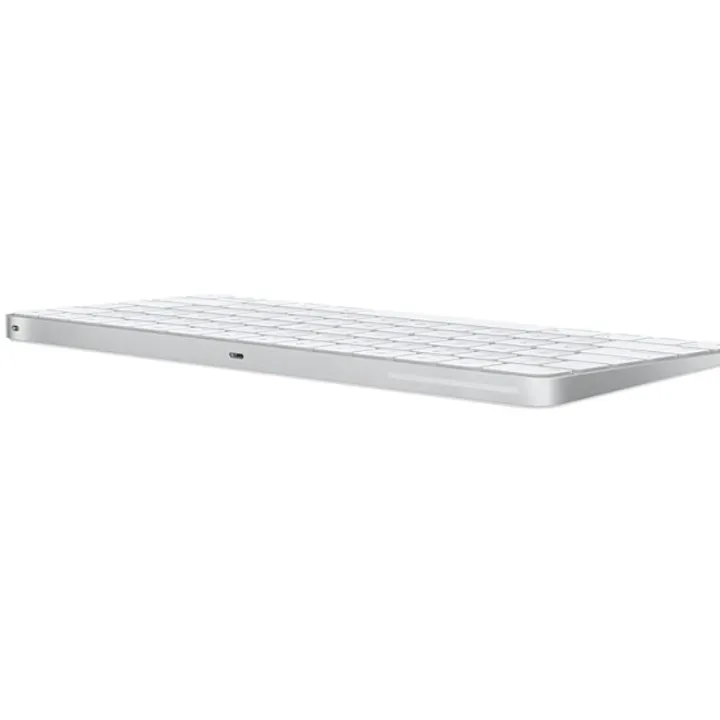

Are you wanting to get pregnant or expecting a little one? Get out free checklist today. This Ultimate Fertility and Pregnancy Checklist gives you everything you need to know for optimized health.

Unlock the secrets to managing stress with our Overcoming Stress Mini Course. Learn how to leverage your nervous system to reduce anxiety and improve well-being. Join today for quick, effective stress relief strategies. Perfect for busy individuals seeking a healthier, stress-free life.
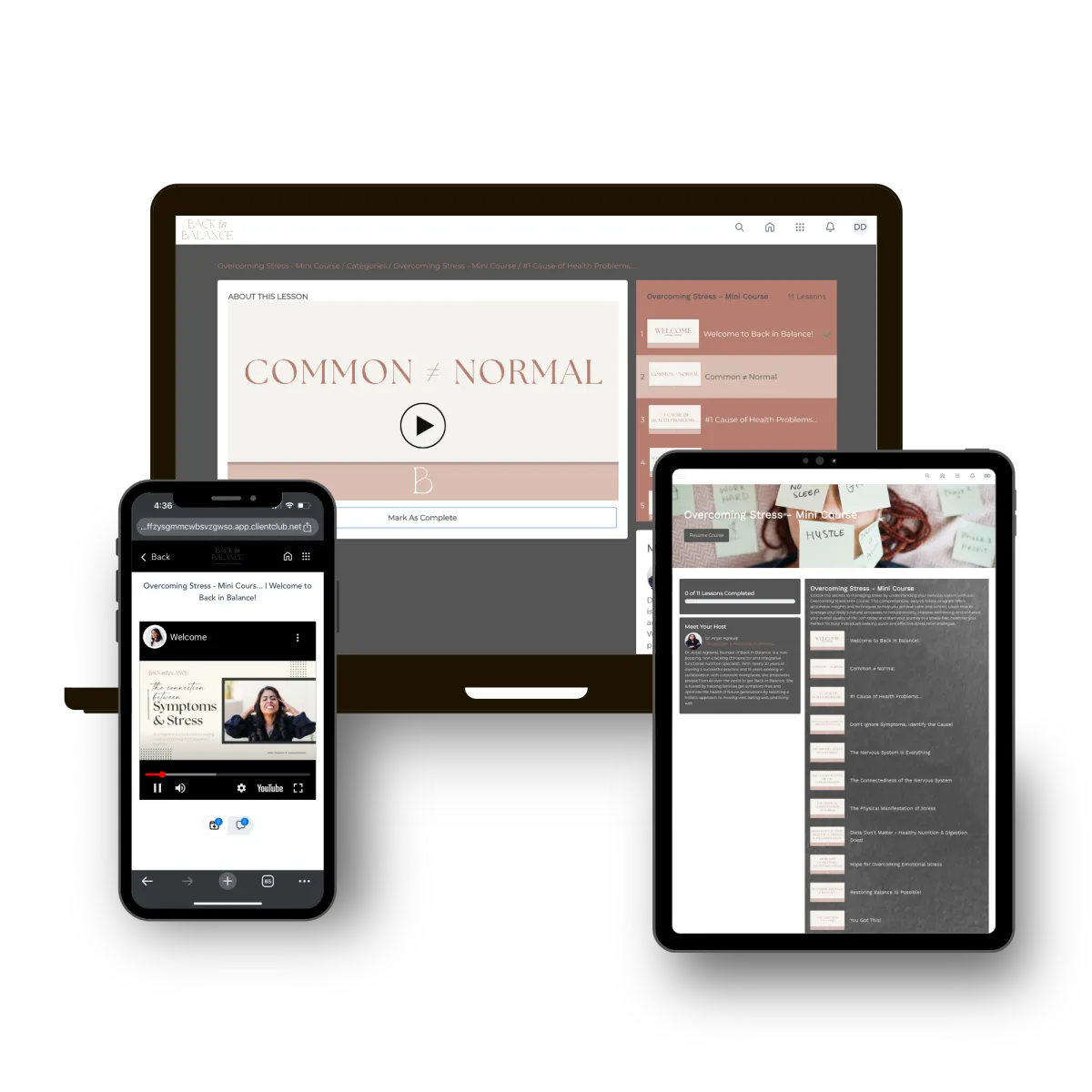
Are you wanting to get pregnant or expecting a little one? Get out free checklist today. This Ultimate Fertility and Pregnancy Checklist gives you everything you need to know for optimized health.

Do you ever feel stiff and sore from sitting all day? If so, download our printable bookmark and walk through the 10 point ergonomic checklist to help you get back in balance from anywhere!
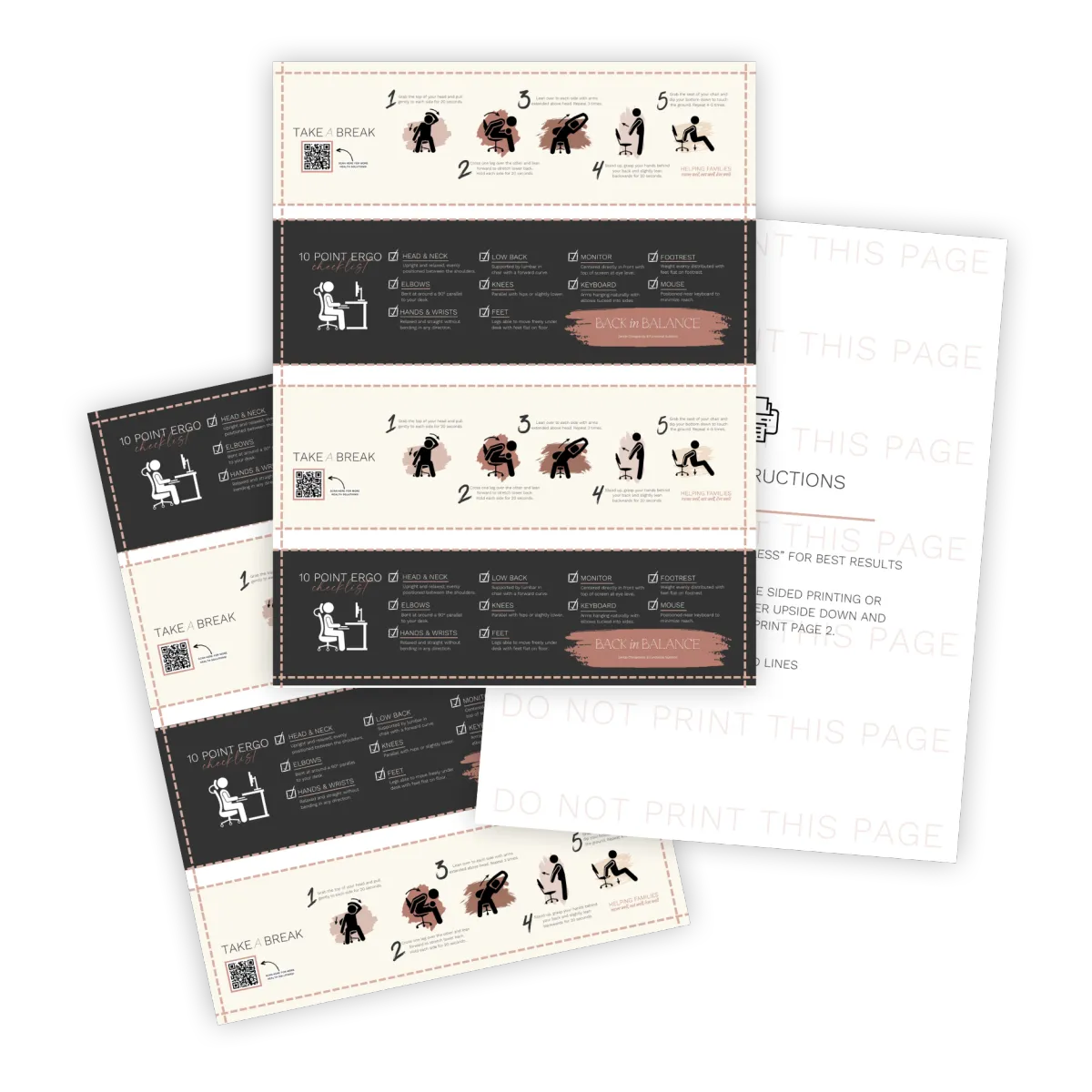

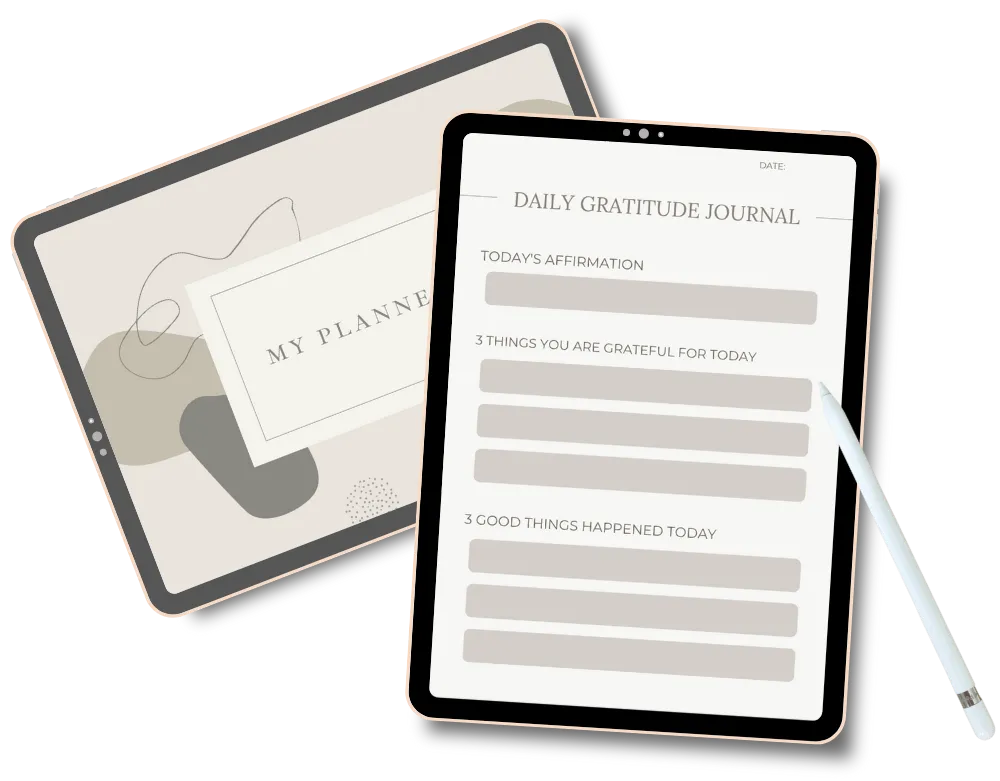

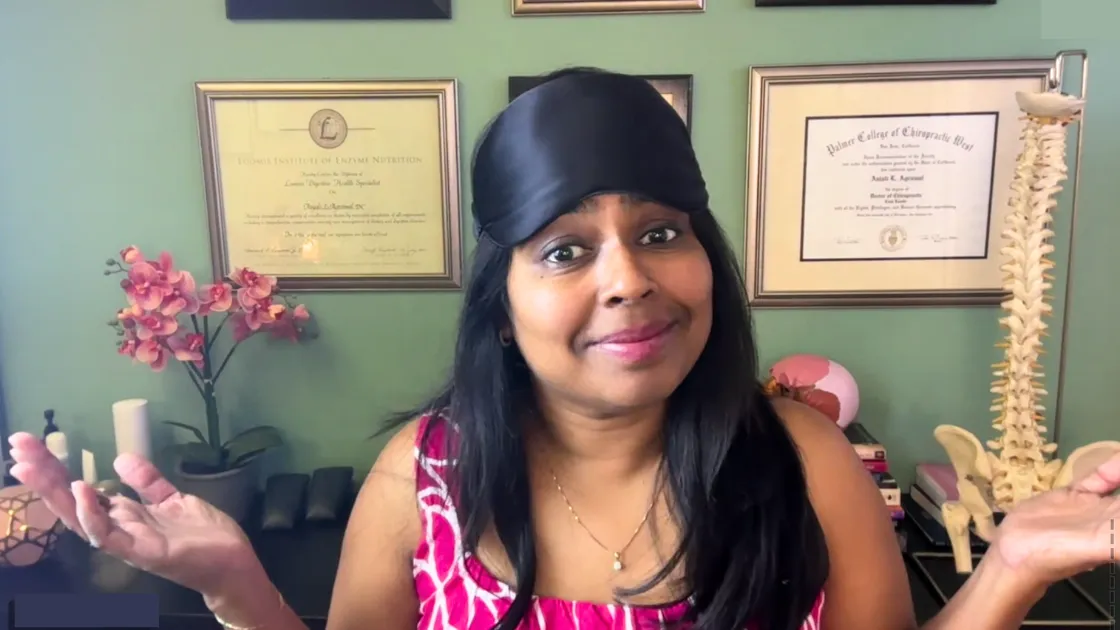
Still Tired After 8 Hours of Sleep? The Hormone + Nervous System Connection Every Woman Over 35 Should Know
Still Tired After 8 Hours of Sleep? The Hormone + Nervous System Connection Every Woman Over 35 Should Know
So you went to bed early, got a full eight hours, and still woke up exhausted. Sound familiar?
It’s not just your age—your hormones and your nervous system are working against your rest. Let’s talk about that.
Welcome back! If you’re new here, I’m Dr. Anjali, and this month we’re diving into the functional side of health—your gut, your hormones, and your resilience—especially after the age of 35.
Why You’re Waking Up Tired
One of the most common things I hear in my office is, “I wake up tired—even after eight hours of sleep.”
If this is you, you’ve probably wondered:
Is it just my age?
Are my hormones off?
Am I doomed to feel this way forever?
The truth is, sleep challenges after 35 aren’t just about getting older. They’re about how hormones, stress, and your nervous system intersect. Once you understand how those pieces fit together, you can take back control over your energy.
Meet Maria: The “Everything Looks Normal” Case
Maria is 38, works full-time, has a five-year-old at home, and is trying to conceive. She told me, “I go to bed at 10, wake up at 6—that’s eight hours. But I’m still so tired.”
Her labs were all “normal.” Thyroid? Normal. Iron? Normal. OB said, “You’re fine.”
But she didn’t feel fine. Maybe you’ve been there too—being told you’re normal when your body feels anything but.
When we dug deeper, we found her hormones were shifting and her nervous system was stuck in fight-or-flight mode. She had been living at that level of stress for so long, it felt “normal.” Her body simply didn’t feel safe enough to rest deeply.
Hormones That Affect Sleep After 35
Let’s unpack the hormone side of this.
Cortisol – This is your stress hormone. It should peak in the morning and drop at night. But for many women, chronic stress keeps it high into the evening. When cortisol is high at bedtime, your body stays alert—making it hard to fall or stay asleep.
Progesterone – Often called the “calming hormone,” progesterone starts to decline after 35. Low levels can make you anxious, restless, and more likely to wake up in the night.
Melatonin + Serotonin – Melatonin is your sleep hormone, but it’s affected by cortisol. If cortisol is high, melatonin can’t rise. And since serotonin (your feel-good hormone) converts into melatonin, your gut health plays a huge role here too. Poor digestion or low serotonin = disrupted sleep cycles.
So even if you’re in bed for eight hours, you might be cycling in lighter sleep stages instead of deep, restorative rest.
Why Your Body Doesn’t Feel Safe Enough to Rest
If your nervous system is still in fight-or-flight mode, your body won’t fully rest—because it’s wired to stay alert “just in case.” This is especially true after 35 when life stressors (family, work, hormones) pile up and your margin for stress gets thinner.
The goal isn’t perfection—it’s helping your body feel safe again through small, consistent resets.
Functional Evening Resets to Try
Here are some practical steps that can make a difference:
1. Create an Evening Flow
Spend 5–7 minutes stretching or doing gentle yoga. Notice where you hold tension—neck, shoulders, hips—and focus there. Movement helps discharge the stress your body has stored all day.
2. Try Breath Work
Try a humming breath (fun to do with kids) or 4-7-8 breathing. Inhale for 4, hold for 7, exhale for 8. The long exhale activates your body’s relaxation response and signals to your nervous system that it’s safe to rest.
3. Eat a Small Protein Snack Before Bed
A little yogurt, nut butter with apple slices, or a small handful of nuts helps stabilize blood sugar and prevent the 2 AM cortisol spike that wakes so many women up.
4. Improve Light Hygiene
Dim lights an hour before bed. Read or journal instead of scrolling. Your brain needs that darkness to boost natural melatonin production.
5. Support with Magnesium
Try a magnesium-rich foot soak, an Epsom salt bath, or a magnesium supplement (powder or leafy greens). It helps calm the nervous system and relax muscles. If you start noticing loose stools, you’re getting too much.
The Bigger Picture: Sleep as Your Foundation for Wellness
Restoring your sleep isn’t just about feeling less groggy. It supports fertility, hormone balance, mood, and long-term health.
When your sleep is restorative, you’re not just surviving—you’re actually replenishing. And that’s the difference between dragging yourself through the day and feeling truly alive.
If you’ve been waking up tired and wondering what’s wrong, please hear this:
“It’s not just your age, and it’s not all in your head. Your hormones and nervous system are asking for support—and the good news is, there are ways to shift that cycle”. ~ Dr. Anjali Agrawal of Back in Balance
If you want help getting started, download myEvening Reset Checklist inside this month’s Functional Resilience Guide. It’s designed for women over 35 and walks you step-by-step through what to do in the hour before bed so you wake up truly rested.

Still Tired After 8 Hours of Sleep? The Hormone + Nervous System Connection Every Woman Over 35 Should Know
Still Tired After 8 Hours of Sleep? The Hormone + Nervous System Connection Every Woman Over 35 Should Know
So you went to bed early, got a full eight hours, and still woke up exhausted. Sound familiar?
It’s not just your age—your hormones and your nervous system are working against your rest. Let’s talk about that.
Welcome back! If you’re new here, I’m Dr. Anjali, and this month we’re diving into the functional side of health—your gut, your hormones, and your resilience—especially after the age of 35.
Why You’re Waking Up Tired
One of the most common things I hear in my office is, “I wake up tired—even after eight hours of sleep.”
If this is you, you’ve probably wondered:
Is it just my age?
Are my hormones off?
Am I doomed to feel this way forever?
The truth is, sleep challenges after 35 aren’t just about getting older. They’re about how hormones, stress, and your nervous system intersect. Once you understand how those pieces fit together, you can take back control over your energy.
Meet Maria: The “Everything Looks Normal” Case
Maria is 38, works full-time, has a five-year-old at home, and is trying to conceive. She told me, “I go to bed at 10, wake up at 6—that’s eight hours. But I’m still so tired.”
Her labs were all “normal.” Thyroid? Normal. Iron? Normal. OB said, “You’re fine.”
But she didn’t feel fine. Maybe you’ve been there too—being told you’re normal when your body feels anything but.
When we dug deeper, we found her hormones were shifting and her nervous system was stuck in fight-or-flight mode. She had been living at that level of stress for so long, it felt “normal.” Her body simply didn’t feel safe enough to rest deeply.
Hormones That Affect Sleep After 35
Let’s unpack the hormone side of this.
Cortisol – This is your stress hormone. It should peak in the morning and drop at night. But for many women, chronic stress keeps it high into the evening. When cortisol is high at bedtime, your body stays alert—making it hard to fall or stay asleep.
Progesterone – Often called the “calming hormone,” progesterone starts to decline after 35. Low levels can make you anxious, restless, and more likely to wake up in the night.
Melatonin + Serotonin – Melatonin is your sleep hormone, but it’s affected by cortisol. If cortisol is high, melatonin can’t rise. And since serotonin (your feel-good hormone) converts into melatonin, your gut health plays a huge role here too. Poor digestion or low serotonin = disrupted sleep cycles.
So even if you’re in bed for eight hours, you might be cycling in lighter sleep stages instead of deep, restorative rest.
Why Your Body Doesn’t Feel Safe Enough to Rest
If your nervous system is still in fight-or-flight mode, your body won’t fully rest—because it’s wired to stay alert “just in case.” This is especially true after 35 when life stressors (family, work, hormones) pile up and your margin for stress gets thinner.
The goal isn’t perfection—it’s helping your body feel safe again through small, consistent resets.
Functional Evening Resets to Try
Here are some practical steps that can make a difference:
1. Create an Evening Flow
Spend 5–7 minutes stretching or doing gentle yoga. Notice where you hold tension—neck, shoulders, hips—and focus there. Movement helps discharge the stress your body has stored all day.
2. Try Breath Work
Try a humming breath (fun to do with kids) or 4-7-8 breathing. Inhale for 4, hold for 7, exhale for 8. The long exhale activates your body’s relaxation response and signals to your nervous system that it’s safe to rest.
3. Eat a Small Protein Snack Before Bed
A little yogurt, nut butter with apple slices, or a small handful of nuts helps stabilize blood sugar and prevent the 2 AM cortisol spike that wakes so many women up.
4. Improve Light Hygiene
Dim lights an hour before bed. Read or journal instead of scrolling. Your brain needs that darkness to boost natural melatonin production.
5. Support with Magnesium
Try a magnesium-rich foot soak, an Epsom salt bath, or a magnesium supplement (powder or leafy greens). It helps calm the nervous system and relax muscles. If you start noticing loose stools, you’re getting too much.
The Bigger Picture: Sleep as Your Foundation for Wellness
Restoring your sleep isn’t just about feeling less groggy. It supports fertility, hormone balance, mood, and long-term health.
When your sleep is restorative, you’re not just surviving—you’re actually replenishing. And that’s the difference between dragging yourself through the day and feeling truly alive.
If you’ve been waking up tired and wondering what’s wrong, please hear this:
“It’s not just your age, and it’s not all in your head. Your hormones and nervous system are asking for support—and the good news is, there are ways to shift that cycle”. ~ Dr. Anjali Agrawal of Back in Balance
If you want help getting started, download myEvening Reset Checklist inside this month’s Functional Resilience Guide. It’s designed for women over 35 and walks you step-by-step through what to do in the hour before bed so you wake up truly rested.
LOCATION
949 Sherwood Ave. #100
Los Altos, CA 94022
HOURS
Sunday 12pm - 4 pm
Monday 10am - 4pm
Tuesday 1pm - 4pm
Wed-Fri 10am - 4pm
Saturday Closed
CONTACT
© Back In Balance 2026 | FAQs | Terms & Conditions | Privacy Policy | Site Credit
©2026 Back In Balance Health. All Rights Reserved. – WEBSITE By: Danielle Damrell Creative Collective, Inc.

